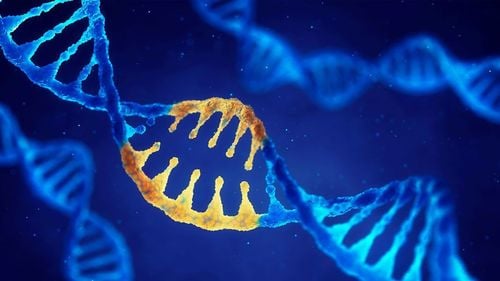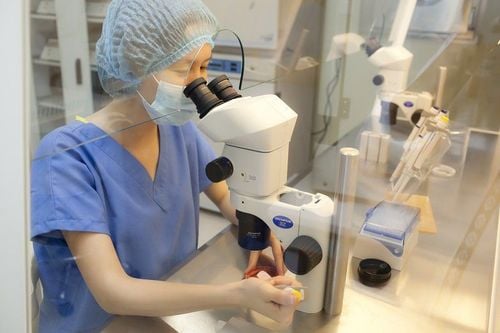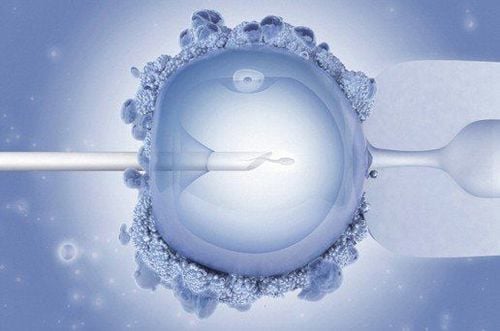This is an automatically translated article.
This can be understood as tests performed before birth to determine the risk of birth defects. From there, we can reduce the risk of malformations as well as take intervention measures in case of need.
1. What is infertility?
Infertility - infertility is understood as a condition when a couple living together, have normal sex and do not use any method of contraception for at least a year and still cannot conceive a child. .2. Infertility diagnosis
2.1. AZF gene testing Y-chromosome analysis in men with severe azoospermia or oligozoospermia has resulted in the identification of three regions in the chromosomal portion of the long arm of the human Y chromosome (Yq11) that are frequently deleted in men with unexplained spermatogenic failure.
PCR analysis of trace elements in the AZFa, AZFb and AZFc (AZF: Azoospermia Factor) regions of the human Y chromosome is an important screening tool in the process of studying infertile men for the selection of infertile men. assisted reproductive technology. Y-chromosomal polymorphisms are the most common genetic cause of male infertility, and screening for these microsomal or heavy-chromosomal men is now standard practice in many infertility centers. .
Devyser AZF v2 kit diagnostic test based on PCR amplification of sequence tagged sites (STS) in the AZFa, AZFb and AZFc regions on the Y chromosome. Successful amplification of the marker STS showed the presence, while absence of PCR amplification was indicative of deletion. Devyser's unique single-tube approach simplifies workflow, reduces practice time, and minimizes the risk of sample mix-ups and contamination during both basic and extensive AZF analysis.
2.2. Genetic testing for hereditary thrombophilia * Factor V Leiden (FV) gene mutation
Factor V Leiden thrombophilia is an inherited disorder of blood clotting. Factor V Leiden is the name of a specific gene mutation that leads to thrombophilia, which is an increased tendency to form abnormal blood clots that can block blood vessels.
People with factor V Leiden thrombophilia have a higher than average risk of developing a type of blood clot called deep vein thrombosis (DVT). DVTs occur most often in the legs, although they can also occur in other parts of the body, including the brain, eyes, liver, and kidneys. Thrombotic Factor V Leiden also increases the risk that blood clots will break out of their original place and travel through the bloodstream. These blood clots can take up residence in the lungs, where they are known as pulmonary embolisms. Although factor V Leiden thrombosis increases the risk of blood clots, only about 10% of individuals with a factor V Leiden mutation develop abnormal blood clots.
Factor V Leiden mutation is associated with a slightly increased risk of miscarriage (miscarriage). Women with this mutation are two to three times more likely to have multiple miscarriages (recurrent) or miscarriages in the second or third trimester. Some research suggests that mutated factor V Leiden may also increase the risk of other complications during pregnancy, including pregnancy-induced high blood pressure (pre-eclampsia), fetal growth retardation, and placental abruption. premature separation from the uterine wall (placental abruption). However, an association between factor V Leiden mutations and these complications has yet to be confirmed. Most women with thrombotic factor V Leiden have difficulty having normal pregnancies.
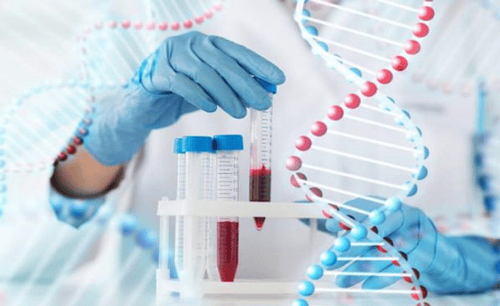
Xét nghiệm gen bệnh tắc nghẽn mạch máu di truyền
* Factor II prothrombin G20210 (FII) gene mutation
The prothrombin 20210 mutation, also known as a Factor II mutation is an inherited condition that increases your blood's chances of forming dangerous blood clots.
All individuals make the protein prothrombin (also known as factor two) that helps blood clot. However, there are some individuals who have a DNA mutation in the gene used to make prothrombin (also known as prothrombin G20210A or a factor II(two) mutation). They are believed to have an inherited hemophilia (blood clotting disorder) known as prothrombin G20210A. When this happens, they make too much of the protein prothrombin.
Prothrombin G20210A and propensity to clot formation: normally, the protein prothrombin is produced to help with blood clotting and is produced in greater amounts after blood vessels are damaged.
People with a mutation in the prothrombin gene produce more prothrombin protein than normal. Since there is more prothrombin protein in the blood, this increases the tendency to form blood clots.
Prothrombin test G20210A: A prothrombin test is done by taking a blood sample and using genetic testing to look at the prothrombin gene. DNA is isolated from the blood cells and the prothrombin gene is examined for mutations in the DNA code. If a gene change is found (20210th character moved from G to A), the person has a prothrombin (or factor II) mutation.
* The methylene-tetrahydrofolate reductase (MTHFR) mutation causes hyperhomocysteinemia
The MTHFR gene provides instructions to make an enzyme called methylenetetrahydrofolate reductase. This enzyme plays a role in processing amino acids, the building blocks of proteins. Methylenetetrahydrofolate reductase is important for the chemical reaction involving the vitamin folate (also called vitamin B9). Specifically, this enzyme converts a form of folate called 5,10-methylenetetrahydrofolate into another form of folate called 5 methyltetrahydrofolate. This is the main form of folate found in the blood and is required for the multi-step process of converting the amino acid homocysteine into another amino acid, methionine. The body uses methionine to make proteins and other important compounds.
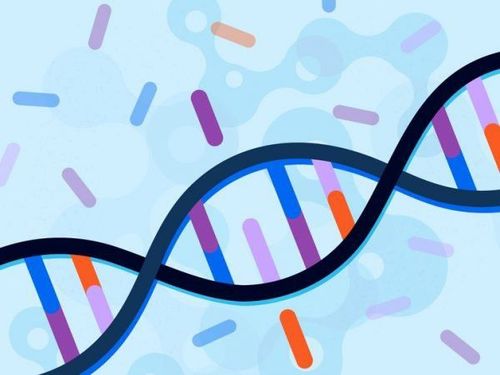
Gen MTHFR cần thiết cho quá trình chuyển đổi axit amin homocysteine thành một axit amin khác
2.3. Karyotype test – Chromosome assembly * What is a Karyotype test?
The karyotype test looks at your size, shape and number of chromosomes. Chromosomes are the parts of your cell that contain your genes. Genes are part of DNA passed down from your mother and father. They carry information that defines your unique features, such as height and eye color.
The normal person has 46 chromosomes, divided into 23 pairs, in each cell. One of each pair of chromosomes comes from your mother, and the other from your father.
If you have more or less than 46 chromosomes, or if there are any abnormalities in the size or shape of the chromosomes, it could mean that you have an inherited disease. Karyotype testing is often used to help find genetic defects in a developing baby.
* What is the role of Karyotype testing?
Humans have 46 chromosomes. Newborns inherit 23 from their mother and 23 from their father. Sometimes, babies have an extra chromosome, a missing chromosome, or an abnormal chromosome. Karyotype testing will see if any of these have happened to your child. The most common things doctors look for with karyotype testing include:
Down syndrome (trisomy 21): The baby has an extra, or third, chromosome 21. This affects how they look and baby's learning.
Edwards syndrome (trisomy 18): A baby has an extra 18th chromosome. These babies often have problems and most don't live longer than a year.
Patau syndrome (trisomy 13): A baby with an extra chromosome 13. These babies often have heart problems and severe intellectual impairment. Most will not live more than a year.
Klinefelter syndrome: A baby boy has an extra X chromosome (XXY). He may go through puberty at a slower rate and he may not be able to have children.
Turner syndrome: A baby girl has a missing or damaged X chromosome. It causes heart problems, neck and low height.
* Purpose of Karyotype testing
Karyotype tests can be used for more than just finding birth defects.
If you have had trouble getting pregnant or have had multiple miscarriages, your doctor may want to check if you or your partner have a chromosomal problem.
You can find out if you have a disorder that you can pass on to your child.
They can test the fetus to see if there is a genetic problem.
They can find the cause of some physical or developmental problems your child or young child has.
Chromosome testing can tell if an infant is a boy or a girl in rare cases.
Some types of cancer can cause chromosomal changes. Karyotype testing can help you get the right treatment.
* When is the Karyotype test indicated?
Karyotype testing can only be done during certain weeks of pregnancy. Your doctor will recommend which karyotype test is right for you based on how far along you are in your pregnancy and your risks.
There is a greater chance that your child has a chromosomal problem if:
You are 35 or older. You have another child or a family member with a chromosomal disorder. You or your partner have something abnormal in your chromosomes. You have a history of miscarriage or stillbirth.
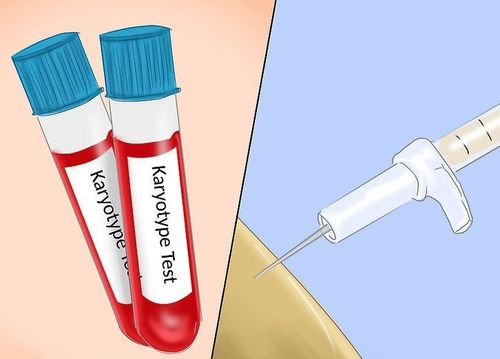
Xét nghiệm Karyotype rất quan trọng xem xét kích thước, hình dạng và số lượng nhiễm sắc thể của bạn
3. Infertility treatment
Many couples wonder if infertility and infertility can be cured or not? However, the success and effectiveness of infertility treatment depends on the individual. If the disease is detected early and treated promptly, it will be more effective than the case detected too late.
Here are some ways to cure infertility and infertility that are being applied commonly and effectively:
3.1. Surgical method - For men: Will perform surgery such as narrowing of the foreskin, blocked sperm ducts, damaged penis,...
- For women: the cause is blocked ducts fallopian tubes, endometriosis. These tissues prevent reproduction from happening, preventing sperm from reaching an egg to fertilize it.
3.2. Assisted Reproductive Methods Inserting sperm into the uterus: This is also a measure of infertility with a high success rate. This method makes it easier for sperm to reach the egg. Through screening, sperm are selected with healthy, well-moveable sperm to help conceive most effectively.
In vitro fertilization : This is a method of assisted conception in a laboratory, both eggs and sperm will be fertilized outside, after being fertilized the embryo will be formed in vitro and then will be inserted into the woman's uterus to nourish the fetus naturally. The success rate when applying this method is quite high.
3.3. Drug treatment Medicine is a simple and commonly used treatment method for couples with fertility problems.
Couples need to have a healthy lifestyle, exercise in moderation to avoid being overweight - obese, exercise to improve health status as well as help improve egg and sperm quality.
Vinmec IVF Reproductive Center is the address of infertility - infertility treatment chosen by many couples. So far, the Center has performed fertility support for over 1000 infertile couples with a success rate of 45%-50%. This rate is equivalent to developed countries such as the UK, USA, Australia,...
The center gathers a team of leading experts in the field of obstetrics and gynecology nationally and internationally, trained in centers leading in the world such as in the US, Singapore, Japan, Australia and famous fertility centers in the world.
With a high level of expertise and extensive experience, Vinmec IVF Center's experts are capable of synchronously and comprehensively deploying the most advanced assisted reproductive techniques today, helping realize the dream of becoming a parent of hundreds of families across Vietnam.
If you have a need for consultation and examination at the Hospitals of the National Health System, please book an appointment on the website for the best service.
Please dial HOTLINE for more information or register for an appointment HERE. Download MyVinmec app to make appointments faster and to manage your bookings easily.





